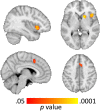Executive Dysfunction in Klinefelter Syndrome: Associations With Brain Activation and Testicular Failure
- PMID: 37595261
- PMCID: PMC10735320
- DOI: 10.1210/clinem/dgad487
Executive Dysfunction in Klinefelter Syndrome: Associations With Brain Activation and Testicular Failure
Abstract
Context: Executive dysfunction is a well-recognized component of the cognitive phenotype of Klinefelter syndrome (KS), yet the neural basis of KS-associated cognitive weaknesses, and their association with testicular failure is unknown.
Objective: We investigated executive function, brain activation, and pubertal development in adolescents with and without KS.
Methods: Forty-three adolescents with KS (mean age 12.3 ± 2.3 years) and 41 typically developing boys (mean age 11.9 ± 1.8 years) underwent pubertal evaluation, behavioral assessment, and completed functional magnetic resonance imaging (fMRI) as they performed an executive function task, the go/no-go task. Group differences in activation were examined. Associations among activation, executive function, and pubertal development measures were tested in secondary analyses.
Results: Boys with KS exhibited reduced executive function, as well as lower activation in brain regions subserving executive function, including the inferior frontal gyrus, anterior insula, dorsal anterior cingulate cortex, and caudate nucleus. Secondary analyses indicated that the magnitude of activation differences in boys with KS was associated with severity of pubertal developmental delay, as indexed by lower testosterone (t(36) = 2.285; P = .028) and lower testes volume (t(36) = 2.238; P = .031). Greater parent-reported attention difficulties were additionally associated with lower testicular volume (t(36) = -2.028; P = .050).
Conclusion: These findings indicate a neural basis for executive dysfunction in KS and suggest alterations in pubertal development may contribute to increased severity of this cognitive weakness. Future studies that examine whether these patterns change with testosterone replacement therapy are warranted.
Keywords: Klinefelter syndrome; brain; executive function; fMRI; inhibition; sex chromosome aneuploidy.
© The Author(s) 2023. Published by Oxford University Press on behalf of the Endocrine Society. All rights reserved. For permissions, please e-mail: journals.permissions@oup.com.
Figures



Similar articles
-
Cognition, Academic Achievement, Adaptive Behavior, and Quality of Life in Child and Adolescent Boys with Klinefelter Syndrome.J Dev Behav Pediatr. 2023 Sep 1;44(7):e476-e485. doi: 10.1097/DBP.0000000000001201. J Dev Behav Pediatr. 2023. PMID: 37696031
-
Associations between brain network, puberty, and behaviors in boys with Klinefelter syndrome.Eur Child Adolesc Psychiatry. 2024 Jun 21:10.1007/s00787-024-02501-y. doi: 10.1007/s00787-024-02501-y. Online ahead of print. Eur Child Adolesc Psychiatry. 2024. PMID: 38904702
-
Alterations in Neural Activation During Facial Emotion Processing in Adolescent Male Participants With Klinefelter Syndrome.J Dev Behav Pediatr. 2024 Jul-Aug 01;45(4):e365-e371. doi: 10.1097/DBP.0000000000001279. Epub 2024 Jul 10. J Dev Behav Pediatr. 2024. PMID: 38990140
-
Gonadal dysfunction and beyond: Clinical challenges in children, adolescents, and adults with 47,XXY Klinefelter syndrome.Am J Med Genet C Semin Med Genet. 2020 Jun;184(2):302-312. doi: 10.1002/ajmg.c.31786. Epub 2020 May 16. Am J Med Genet C Semin Med Genet. 2020. PMID: 32415901 Review.
-
Klinefelter syndrome and fertility: sperm preservation should not be offered to children with Klinefelter syndrome.Hum Reprod. 2016 Sep;31(9):1952-9. doi: 10.1093/humrep/dew179. Epub 2016 Jul 13. Hum Reprod. 2016. PMID: 27412247 Review.
Cited by
-
Understanding the Neuropsychological Implications of Klinefelter Syndrome in Pediatric Populations: Current Perspectives.Pediatr Rep. 2024 May 25;16(2):420-431. doi: 10.3390/pediatric16020036. Pediatr Rep. 2024. PMID: 38921701 Free PMC article. Review.
-
Klinefelter Syndrome: A Genetic Disorder Leading to Neuroendocrine Modifications and Psychopathological Vulnerabilities in Children-A Literature Review and Case Report.Children (Basel). 2024 Apr 24;11(5):509. doi: 10.3390/children11050509. Children (Basel). 2024. PMID: 38790504 Free PMC article. Review.
-
Using Organoids to Model Sex Differences in the Human Brain.Biol Psychiatry Glob Open Sci. 2024 Jun 4;4(5):100343. doi: 10.1016/j.bpsgos.2024.100343. eCollection 2024 Sep. Biol Psychiatry Glob Open Sci. 2024. PMID: 39092139 Free PMC article. Review.
References
-
- Smyth CM, Bremner WJ. Klinefelter syndrome. Arch Intern Med. 1998;158(12):1309‐1314. - PubMed
-
- Herlihy AS, McLachlan RI, Gillam L, Cock ML, Collins V, Halliday JL. The psychosocial impact of Klinefelter syndrome and factors influencing quality of life. Genet Med. 2011;13(7):632‐642. - PubMed
-
- DeLisi LE, Maurizio AM, Svetina C, et al. . Klinefelter's syndrome (XXY) as a genetic model for psychotic disorders. Am J Med Genet B Neuropsychiatr Genet. 2005;135(1):15‐23. - PubMed
-
- Fales CL, Knowlton BJ, Holyoak KJ, Geschwind DH, Swerdloff RS, Gonzalo IG. Working memory and relational reasoning in Klinefelter syndrome. J Int Neuropsychol Soc. 2003;9(6):839‐846. - PubMed
-
- Boone KB, Swerdloff RS, Miller BL, et al. . Neuropsychological profiles of adults with Klinefelter syndrome. J Int Neuropsychol Soc. 2001;7(4):446‐456. - PubMed
MeSH terms
Substances
Grants and funding
LinkOut - more resources
Full Text Sources
Medical

